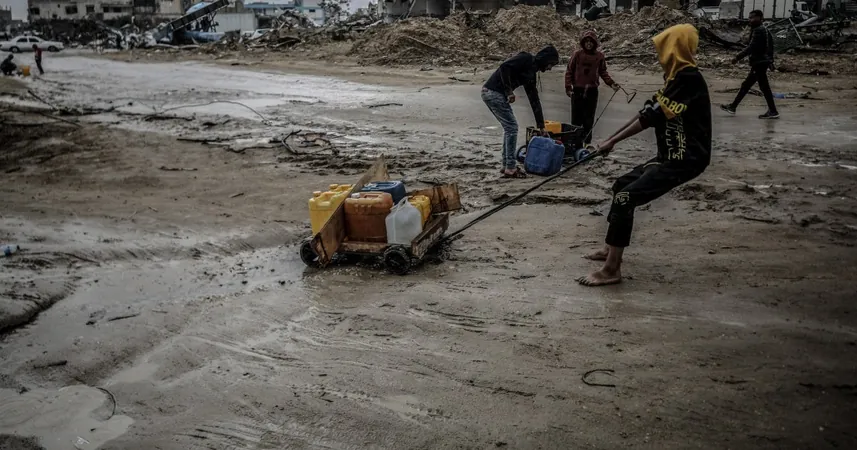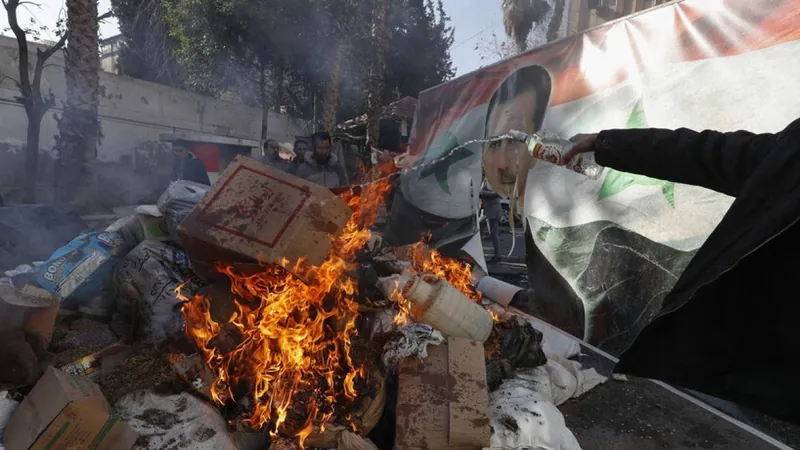
Unveiling the Tragedy: Is Israel Committing Genocide in Gaza?
2024-12-19
Author: Jessica Wong
Overview
Israeli authorities stand accused of engaging in actions that may constitute genocide against Palestinian civilians in Gaza, deliberately infringing upon their right to access essential resources like water. The ongoing humanitarian crisis, which has escalated since October 2023, has reportedly led to thousands of fatalities, raising serious concerns about potential crimes against humanity.
Human Rights Watch Report
According to a recent, detailed report by Human Rights Watch titled “Extermination and Acts of Genocide: Israel Deliberately Depriving Palestinians in Gaza of Water,” Israeli forces systematically restricted access to safe drinking water. This alarming policy resulted in critical shortages and severely compromised sanitation, posing a direct threat to the lives of the Gazan population.
Statements from Officials
Tirana Hassan, Executive Director of Human Rights Watch, emphasized, “Water is essential for human life. The Israeli government’s actions are not mere oversight but a calculated strategy to deprive Palestinians in Gaza of their basic survival needs.” The implications of this systemic denial of water have been catastrophic, leading to rampant health crises, including dehydration and disease outbreaks.
Methodology of the Report
The extensive report examined data from over 66 interviews with Gazans, healthcare professionals, and aid workers, alongside satellite imagery and on-ground evidence. The findings indicate widespread and intentional damage to Gaza’s water and sanitation infrastructure, coupled with restrictions on the entry of necessary supplies and equipment—actions seen as establishing conditions conducive to mass extermination in contravention of international humanitarian law.
The Blockade of Gaza
Since the violent escalation initiated by Hamas on October 7, 2023, Israeli authorities have implemented a complete blockade of Gaza, which includes cutting off all electricity and fuel supplies. Israeli Defense Minister Yoav Gallant’s declaration of a “complete siege” soon followed. Human Rights Watch reports that these measures left the residents of Gaza without water, food, or medical supplies, further exacerbating the humanitarian disaster.
International Response and Challenges
Even after intervention from the International Court of Justice (ICJ), which called upon Israel to protect Palestinian civilians and provide humanitarian assistance like food, water, and electricity, the blockade remains largely intact. Many humanitarian aid efforts have been obstructed, and the blockade persists despite alarming UN reports highlighting the critical shortage of potable water across the territory—the UN recorded that northern Gaza residents lacked access to single drops of drinking water for several months.
Destruction of Infrastructure
Moreover, the destruction of crucial water and sanitation facilities during military operations suggests a troubling pattern of intent. Human Rights Watch’s analysis leads to the unsettling conclusion that Israel’s conduct could amount to genocide. The findings are bolstered by statements from Israeli officials that imply a desire to eradicate the Palestinian presence in Gaza.
Health Crisis
The healthcare system in Gaza faces collapse, making it difficult to accurately report the number of deaths or illnesses arising from the deteriorating conditions. Estimates suggest that thousands may have succumbed to preventable diseases linked to inadequate water access, adding to the grim tally of over 44,000 lives claimed by direct hostilities.
Impact on Vulnerable Populations
The dire consequences of this water deprivation are particularly severe for vulnerable groups such as infants, pregnant women, and those with disabilities. As diarrheal diseases, hepatitis A, skin infections, and respiratory ailments proliferate, the urgent need for international intervention becomes ever more critical.
Call for Global Action
Human Rights Watch has urged governments worldwide to cease military support for Israel, cautioning that doing so risks complicity in the ongoing atrocities. “To turn a blind eye to these grave crimes is unacceptable. Immediate actions such as arms embargoes and targeted sanctions are necessary to protect innocent lives,” Hassan urged.
Conclusion
This escalating humanitarian tragedy not only raises questions of legality and ethical responsibility but also casts a shadow on the international community’s response to what could be categorized as one of the gravest humanitarian crises of our time. As the world watches, the urgent call for accountability grows louder. Will significant global powers prioritize lives over geopolitical interests? Now is the time for action, not indifference.




 Brasil (PT)
Brasil (PT)
 Canada (EN)
Canada (EN)
 Chile (ES)
Chile (ES)
 España (ES)
España (ES)
 France (FR)
France (FR)
 Hong Kong (EN)
Hong Kong (EN)
 Italia (IT)
Italia (IT)
 日本 (JA)
日本 (JA)
 Magyarország (HU)
Magyarország (HU)
 Norge (NO)
Norge (NO)
 Polska (PL)
Polska (PL)
 Schweiz (DE)
Schweiz (DE)
 Singapore (EN)
Singapore (EN)
 Sverige (SV)
Sverige (SV)
 Suomi (FI)
Suomi (FI)
 Türkiye (TR)
Türkiye (TR)